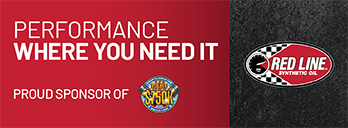UP FRONT: DO THE MATH
Right at the outset, let’s silence those critics of the National Hot Rod Association who appear to be blaming the sanctioning

body for the nation’s current financial situation. It is neither the
fault or responsibility of drag racing’s leading organization. The NHRA
had nothing to do with the meltdown on Wall Street or the horror show
that has become the real estate/mortgage industry, nor is it their
responsibility to solve the problems of lost or financially reduced
sponsorships.
Some of the suggestions I’ve been hearing for solving these problems
have been amazingly naïve, and point to a somewhat surprising lack of
understanding of the business side of drag racing. Individuals who have
proven to be ahead of the curve when it comes to tuning cars and
running race teams are way behind it when it comes to understanding
drag racing’s overall place in America. The harsh reality is that as
big as we’d like to think we are, we live in a nation of more than 305
million people. For the vast majority of them the term “drag racing”
stirs only vague thoughts, often negative in nature. In a private
conversation one of the sport’s most honored individuals put it
succinctly when he said, “Drag racing is only an essential activity to
those of us who make our livings from it.”
Right at the outset, let’s silence those critics of the National Hot Rod Association who appear to be blaming the sanctioning

body for the nation’s current financial situation. It is neither the fault or responsibility of drag racing’s leading organization. The NHRA had nothing to do with the meltdown on Wall Street or the horror show that has become the real estate/mortgage industry, nor is it their responsibility to solve the problems of lost or financially reduced sponsorships.
Some of the suggestions I’ve been hearing for solving these problems have been amazingly naïve, and point to a somewhat surprising lack of understanding of the business side of drag racing. Individuals who have proven to be ahead of the curve when it comes to tuning cars and running race teams are way behind it when it comes to understanding drag racing’s overall place in America. The harsh reality is that as big as we’d like to think we are, we live in a nation of more than 305 million people. For the vast majority of them the term “drag racing” stirs only vague thoughts, often negative in nature. In a private conversation one of the sport’s most honored individuals put it succinctly when he said, “Drag racing is only an essential activity to those of us who make our livings from it.”
Hard to argue with that. As passionate as we might be about it, we have to remember that for the corporate world the thrills and excitement are meaningless. All they care about are the results -- massive media exposure and positive audience impressions. In some respects winning may actually be of secondary importance. As a sponsor rep explained years ago in a conversation about their driver’s lack of racing success, “We’d love it if he could win, but you’ve never seen him in meetings with our corporate brass and customers. He does an amazing job, whether they’re asking about our products or his race car. All they know is that he treats them respectfully, and happens to be a driver. For us, he wins every time he puts on a suit and tie and shows up at one of our conventions or meetings.”
What race fans need to understand is that, for the most part, during trying financial times most corporate entities begin cutting back, and the first area they seek to make cuts is in promotions and advertising. I don’t agree with this philosophy, believing instead that those companies who dig deep and continue to promote their products and services are the ones who come out of the dark tunnel of tough times ahead of their competitors. Potential customers, who are also suffering, often remember when things get better it’s that Sony TV they’ve been hearing about that they’ll buy, or that Pontiac.
a d v e r t i s e m e n t
Click to visit our sponsor's website
In recent days there have been some interesting announcements from both NASCAR and the IRL and finally, the NHRA. The Indy Racing League announced the cancellation of their event in Detroit, an announcement that many misunderstood as being solely a response to the economic situation. On the contrary, this event failed due to a lack of corporate sponsorship (which is the result of the economy, of course), so it shouldn’t have been misconstrued as an attempt on the part of the league to make things easier for their competitors. Take my word for it, if there’d been enough backing there would have been a race, because as depressed as the domestic automotive industry might be right now, the odds are it will come back at some point, and that support will be critically important to open wheel racing, just as it will to drag racing and NASCAR.
On the NASCAR side there have been several announcements regarding a reduction in ticket prices, and they’re worth delving into. Seats on the back straightaway at Daytona are being offered at $55, a $44 reduction from their normal price. These may not be the most desirable seats at the track, but the number being offered is significant. A substantial number of seats at Auto Club Raceway in California for their Cup race have been reduced from $55 to $35. Talladega Speedway is offering seats that normally go for $75 for $40, also on the back straightaway. Darlington has 9,000 seats available for $35, a $10 reduction, and Richmond International has 18,000 seats on the discount plan, some being reduced by 50 percent to $40 and others being reduced 25 percent to $55.
And this brings us to the NHRA, which announced what they’re terming their “fan-relief program” last week. In all fairness, the NHRA is not in a position to muscle its national event facilities without their approval, so the plan will, at present only apply to the tracks they own – Pomona, Gainesville, Atlanta and Indianapolis. Clearly, they hope that other tracks will follow their lead, but to date the only specific plan announced is for the Winternationals, and in our view, is far less than it could be.
The NHRA will offer a total of only 1,500 discounted tickets per day in General Admission (6,000 for the entire weekend), all for the most unfavorable seating at Auto Club Raceway, but again to be fair, this is basically the same kind of discounted seating that NASCAR is offering. Located on the west side of the track, these seats will be the farthest from the starting line, meaning a visit to the pits will entail quite a hike. The tickets will be priced at $20 each, and are only available through advanced sale, on a first-come, first-served basis, and can be obtained by calling 800-884-6472. In all honesty, it’s likely that the discount tickets have already been snapped up, but it’s at least worth a call.
a d v e r t i s e m e n t
Click to visit our sponsor's website
A Thursday ticket will save the buyer just $5, but with prices escalating through the weekend that savings becomes $15 on Friday and $32 each for Saturday and Sunday – if you’re among the lucky 1,500 to get them. If the program is a sellout NHRA will have reduced its income from the event by $126,000, but at least some of that may be counterbalanced by proportionally increased souvenir, food and parking revenues. However, given the sheer number of discounted tickets being offered by various NASCAR tracks it appears that stock car racing is offering its fans far greater opportunities for discounts than is the NHRA. We may be smaller in terms of event attendance, but that appears to be just one more reason that more discounted tickets need to be made available. We’ve got to keep the fans we have, and if reducing NHRA’s ticket revenues even further – at least for this year – is what it’s going to take, it should be done.
In addition to this discount NHRA will now admit children under 12 without charge when accompanied by a full-price-paying adult General Admission ticket buyer. They’re also offering a single free Reserved Seat ticket for Friday’s action to active duty members of the military, but could have scored a lot of public relations points by extending this offer to not only the active duty serviceman or woman, but to his or her family as well. Ah, well, we’re just dreamers, I guess.
We applaud the NHRA for this effort, but sincerely hope that future announcements about the events in Florida, Georgia and Indianapolis offer drag racing’s hard-pressed fans an even better deal. We also hope that NHRA member tracks come up with something similar – or better -- but only time will tell about that.
Could the NHRA have done more? Certainly. Even though it’s possible the early signs of impending doom in terms of short fields in the pro ranks may have been somewhat overstated, some steps could have been taken to ease the financial burden on those who will try to make the full tour.
One widely heard suggestion is the elimination of one pro qualifying session. While this won’t improve a team’s fixed costs of travel, food and lodging, each run that is eliminated greatly reduces the overall costs of racing. The wear and tear on parts, the consumption of nitro and the prospect of the ultimate in expenditures – the failure of a complete engine assembly -- would be reduced by 25 percent.
Considering that at least visually it appears that at most events the most lightly attended pro session is the first one on Friday afternoon, that’s the one we’d advocate eliminating.
a d v e r t i s e m e n t
Click to visit our sponsor's website
The NHRA response to this suggestion is going to be that eliminating that session correspondingly reduces the value of a Friday ticket, and we won’t argue the point, and simply suggest reducing the price accordingly. The next point from the NHRA is that a further reduction in ticket revenues will make it somewhat difficult to pay the event purse, and while we question that to a degree, if we’re all in agreement that these are tough, trying times, isn’t it time for the sport’s leaders to tighten their belts even further, bite the bullet, and make these things happen? Isn’t it time to at least consider reducing their own salaries back to 2007 levels? How many people do you know who have had to accept a 20 percent reduction in their own salaries in order to keep working?
Before you ask, in terms of the two Pomona races (and it’s too late to do anything about the Winternationals), this would mean the elimination of the Thursday pro sessions. Because of the importance and prestige of the U.S. Nationals – and trying to balance the need to reduce everyone’s costs – fans, sponsors and competitors – we’d advocate two pro sessions Friday, two on Saturday and eliminations on Sunday, leaving Monday as a rain date or travel day. Remember, the NHRA has been unable to sell the sponsorship for the Funny Car Showdown, so that’s no longer a consideration, and the Pro Bike Battle could still be staged on Saturday.
Another way of making things easier on the Top Fuel and Funny Car runners – and like it or not, these cars are the magnets that draw the fans – is to have NHRA break the stranglehold that one company has on the sale of what’s turned out to be questionable quality nitromethane. Minimal research on the part of this publication and the efforts of a couple of concerned team owners quickly proved that last summer’s purported shortage of nitro was a fabrication. There was plenty of high-quality nitro available if one had the financial wherewithal to pay for it in container loads, and it would appear, at least, that the official supplier didn’t have the cash to buy the product. An open marketplace would result in lower prices, and there isn’t a reader looking this piece over who doesn’t know, in his or her heart, that there isn’t a contract written that can’t be broken or amended – if the parties involved care enough to make that happen.
But these decisions will have to be made by individuals who will have to put NHRA Drag Racing before their own personal desires. In the 44 years I’ve covered this endeavor I can’t recall a single instance of the leaders of the NHRA suffering because of bad decisions or weakened business conditions. The sacrifices have always been made by the racers and fans.
| {loadposition feedback} |






































